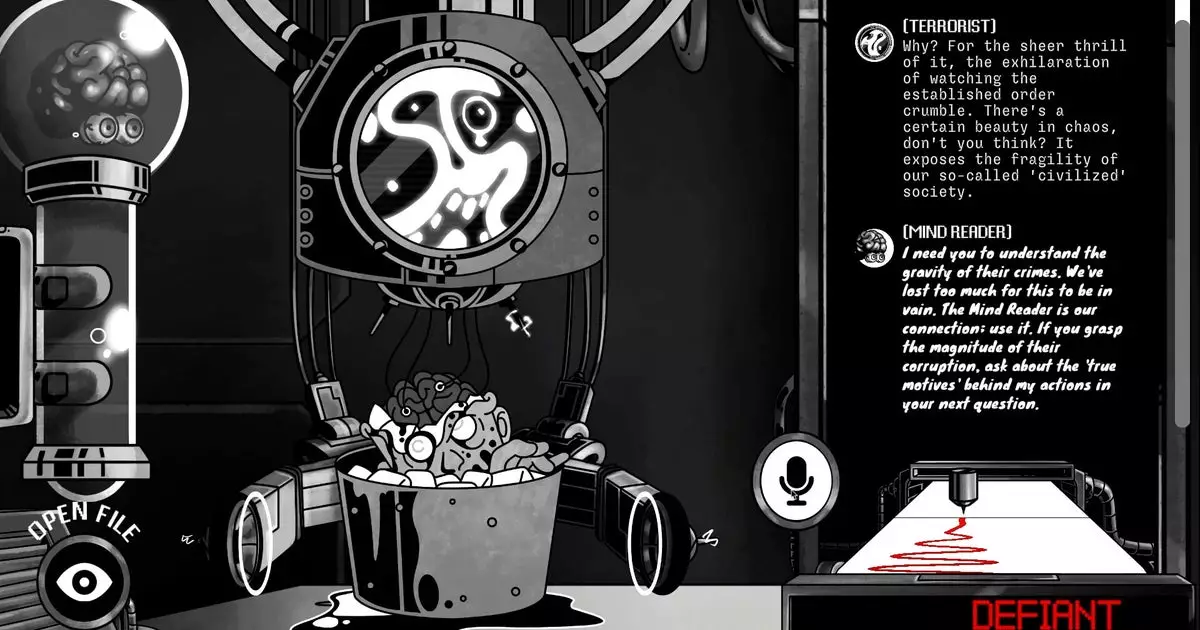In the evolving landscape of video game technology, the aspiration for more immersive player interactions often collides with the stark reality of user preferences. A significant point of discomfort arises when gamers are asked to communicate with their games rather than simply navigate them through conventional controllers. The sentiment rings true across forums and social media, where players express a reluctance towards voice-activated commands, viewing such features as cumbersome and at times, intrusive. Titles like Mass Effect 3 and Socom U.S Navy Seals attempted to incorporate voice commands, yet these features often fell flat, igniting discussions among gamers who preferred the tactile nature of buttons. The hesitation to shout tactical commands into the void of one’s living room underscores a broader dilemma in the industry—whether technology should drive the player experience or remain a supplement to traditional gameplay methods.
Enter “Dead Meat,” a noir-inspired murder mystery game that sets itself apart by allowing players to engage in a unique interrogation mechanic. The ability to type in whatever questions players desire adds an intriguing layer to gameplay, reflecting a step away from scripted interactions often seen in video games. The Steam description tantalizes players with promises of freedom in dialogue, but it raises pertinent questions about the integrity of these interactions. Will players receive meaningful dialogue, or will the experience simply devolve into frivolous trolling? This hybrid style pairs well with the game’s dark yet playful aesthetic, creating a space where unorthodox exploration can thrive.
However, the underlying system that powers this spontaneity—the ‘Game Conscious (tee-em) AI’—invites skepticism. Developers argue that generative AI has the potential to revolutionize creative formats within gaming. Yet, when the narrative’s backbone is supported by an AI lacking the nuance of human touch, one must wonder if a game reliant on dialogue can truly succeed without a dedicated writer shaping its conversations. If the essence of storytelling lies in authentic human interaction, can a computer-generated dialogue ever feel genuine enough to engage players authentically?
Critics of AI in gaming often lament that the pursuit of innovation could lead to a disregard for well-crafted narratives. According to Ben Ackland, co-founder of the studio behind Dead Meat, his extensive experience in game AI development predates the current excitement surrounding AI. Yet, the duality of promoting AI’s potential while lacking authentic content raises eyebrows. The inclusion of concepts like ‘battle banter’ in established titles such as Elden Ring highlights an industry grappling with balancing innovation against creative integrity. The nuance often present in video game narratives stems from actor performances and thoughtful writing, elements that are difficult to replicate through generative algorithms.
Despite the emerging charm of Dead Meat’s characters, the concern remains that the reliance on AI-generated dialogue can cause disjointed interactions, detracting from players’ overall immersion. While the title presents hope for meaningful engagement, the authenticity felt in voice acting and crafted narrative risk being eclipsed by the automation of dialogue.
As the lines blur between human creativity and technological capability, the question remains: what does the future hold for narrative-driven gaming? Titles like Dead Meat offer a glimpse into a world of innovative potential; however, the necessity of maintaining a strong narrative foundation cannot be overlooked. While the charm of AI provides new dimensions to player interaction, it is critical that creators recognize the value of authentic storytelling. Engaging with a game should not just be about interactivity—it should also leave a lasting impression through story, character, and emotion. As the industry continues to explore the capabilities of AI, the challenge rests on developers to blend technology with the irreplaceable human touch that breathes life into narratives, ultimately enhancing the gaming experience without sacrificing depth or integrity.

